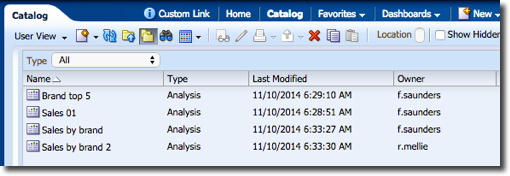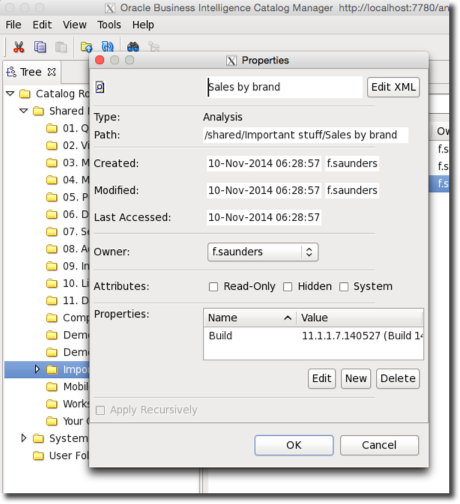Auditing OBIEE Presentation Catalog Activity with Custom Log Filters
A question that I’ve noticed coming up a few times on the OBIEE OTN forums goes along the lines of “How can I find out who deleted a report from the Presentation Catalog?”. And whilst the BI Server’s Usage Tracking is superb for auditing who ran what report, we don’t by default have a way of seeing who deleted a report.
The Presentation Catalog (or “Web Catalog” as it was called in 10g) records who created an object and when it was last modified, accessible through both OBIEE’s Catalog view, and the dedicated Catalog Manager tool itself:


But if we want to find out who deleted an object, or maybe who modified it before the most recent person (that is, build up an audit trail of who modified an object) we have to dig a bit deeper.
Presentation Services Log Sources
Perusing the OBIEE product manuals, one will find documented additional Logging in Oracle BI Presentation Services options. This is more than just turning up the log level en masse, because it also includes additional log writers and filters. What this means is that you can have your standard Presentation Services logging, but then configure a separate file to capture more detailed information about just specific goings on within Presentation Services.
Looking at a normal Presentation Services log (in $FMW_HOME/instances/instance1/diagnostics/logs/OracleBIPresentationServicesComponent/coreapplication_obips1/) you’ll see various messages by default - greater or fewer depending on the health of your system - but they all use the Location stack track, such as this one here:
[2014-11-10T06:33:19.000-00:00] [OBIPS] [WARNING:16] [] [saw.soap.soaphelpers.writeiteminfocontents] [ecid: 11d1def534ea1be0:15826b4a:14996b86fbb:-8000-0000000000001ede,0:1] [tid: 2569512704] Resolving and writing full ACL for path /shared/Important stuff/Sales by brand[[
File:soaphelpers.cpp
Line:609
Location:
saw.soap.soaphelpers.writeiteminfocontents
saw.soap.catalogservice
saw.SOAP
saw.httpserver.request.soaprequest
saw.rpc.server.responder
saw.rpc.server
saw.rpc.server.handleConnection
saw.rpc.server.dispatch
saw.threadpool.socketrpcserver
saw.threads
Path: /shared/Important stuff/Sales by brand
AuthProps: AuthSchema=UidPwd-soap|PWD=******|UID=weblogic|User=weblogic
ecid: 11d1def534ea1be0:15826b4a:14996b86fbb:-8000-0000000000001ede,0:1
ThreadID: 2569512704
And it is the Location that is of interest to us here, because it’s what gives hints about the types of log messages that can be emitted and that we may want to filter. For example, the one quoted above is evidently something to do with the Presentation Catalog and SOAP, which I’d guess is a result of Catalog Manager (which uses web services/SOAP to access OBIEE).
To get a full listing of all the possible log sources, first set up the BI command line environment with bi-init:
source $FMW_HOME/instances/instance1/bifoundation/OracleBIApplication/coreapplication/setup/bi-init.sh
and then run:
sawserver -logsources
(If you get an error, almost certainly you didn’t set up the command line environment properly with bi-init). You’ll get an list of over a thousand lines (which gives you an idea of quite how powerful this granular logging is). Assuming you’ll want to peruse it at your leisure, it makes sense to write it to disk which if you’re running this on *nix you can simply do thus:
sawserver -logsources > sawserver.logsources.txt
To find what you want on the list, you can just search through it. Looking for anything related to “catalog” and narrowing it down further, I came up with these interesting sources:
[oracle@demo ~]$ sawserver -logsources|grep catalog|grep local saw.catalog.item.getlocalized saw.catalog.local saw.catalog.local.checkforcatalogupgrade saw.catalog.local.copyItem saw.catalog.local.createFolder saw.catalog.local.createLink saw.catalog.local.deleteItem saw.catalog.local.getItemACL saw.catalog.local.getItemInfo saw.catalog.local.loadCatalog saw.catalog.local.moveItem saw.catalog.local.openObject saw.catalog.local.readObject saw.catalog.local.search saw.catalog.local.setItemACL saw.catalog.local.setItemInfo saw.catalog.local.setMaintenanceMode saw.catalog.local.setOwnership saw.catalog.local.writeObject
Configuring granular Presentation Services logging
Let us see how to go and set up this additional logging. Remember, this is not the same as just going to Enterprise Manager and bumping the log level to 11 globally - we’re going to retain the default logging level, but for just specific actions that occur within the tool, capture greater information. The documentation for this is here.
The configuration is found in the instanceconfig.xml file, so like all good sysadmins let’s take a backup first:
cd $FMW_HOME/instances/instance1/config/OracleBIPresentationServicesComponent/coreapplication_obips1/ cp instanceconfig.xml instanceconfig.xml.20141110
Now depending on your poison, open the instanceconfig.xml directly in a text editor from the command line, or copy it to a desktop environment where you can open it in your favourite text editor there. Either way, these are the changes we’re going to make:
- Locate the
<Logging>section. Note that within it there are three child entities -<Writers>,<WriterClassGroups>and<Filters>. We’re going to add an entry to each. Under
<Writers>, add:<Writer implementation="FileLogWriter" name="RM Presentation Catalog Audit" disableCentralControl="true" writerClassId="6" dir="{%ORACLE_BIPS_INSTANCE_LOGDIR%}" filePrefix="rm_pres_cat_audit" maxFileSizeKb="10240" filesN="10" fmtName="ODL-Text"/>This defines a new writer than will write logs to disk (FileLogWriter), in 100MB files of which it’ll keep 10. If you’re defining additional Writers, make sure they have a unique writerClassId See docs for detailed syntax.
Under
<WriterClassGroups>add:<WriterClassGroup name="RMLog">6</WriterClassGroup>
This defines the RMLog class group as being associated with writerClassId 6 (as defined above), and is used in the Filters section to direct logs. If you wanted you could log entries to multiple logs (eg both file and console) this way.
Under
<Filters>add:<FilterRecord writerClassGroup="RMLog" disableCentralControl="true" path="saw.catalog.local.moveItem" information="32" warning="32" error="32" trace="32" incident_error="32"/> <FilterRecord writerClassGroup="RMLog" disableCentralControl="true" path="saw.catalog.local.deleteItem" information="32" warning="32" error="32" trace="32" incident_error="32"/>
Here we’re defining two event filters, with levels turned up to max (32), directing the capture of any occurences to the RMLog writerClassGroup.
After making the changes to instanceconfig.xml, restart Presentation Services:
$FMW_HOME/instances/instance1/bin/opmnctl restartproc ias-component=coreapplication_obips1
Here’s the completed instanceconfig.xml from the top of the file through to the end of the <Logging> section, with my changes overlayed the defaults:
<?xml version="1.0" encoding="UTF-8" standalone="no"?>
<!-- Oracle Business Intelligence Presentation Services Configuration File -->
<WebConfig xmlns="oracle.bi.presentation.services/config/v1.1">
<ServerInstance>
<!--This Configuration setting is managed by Oracle Enterprise Manager Fusion Middleware Control--><CatalogPath>/app/oracle/biee/instances/instance1/SampleAppWebcat</CatalogPath>
<DSN>AnalyticsWeb</DSN>
<Logging>
<Writers>
<!--This Configuration setting is managed by Oracle Enterprise Manager Fusion Middleware Control--><Writer implementation="FileLogWriter" name="Global File Logger" writerClassId="1" dir="{%ORACLE_BIPS_INSTANCE_LOGDIR%}" filePrefix="sawlog" maxFileSizeKb="10240" filesN="10" fmtName="ODL-Text"/>
<!--This Configuration setting is managed by Oracle Enterprise Manager Fusion Middleware Control--><Writer implementation="CoutWriter" name="Console Logger" writerClassId="2" maxFileSizeKb="10240"/>
<!--This Configuration setting is managed by Oracle Enterprise Manager Fusion Middleware Control--><Writer implementation="EventLogWriter" name="System Event Logger" writerClassId="3" maxFileSizeKb="10240"/>
<!-- The following writer is not centrally controlled -->
<Writer implementation="FileLogWriter" name="Webcat Upgrade Logger" disableCentralControl="true" writerClassId="5" dir="{%ORACLE_BIPS_INSTANCE_LOGDIR%}" filePrefix="webcatupgrade" maxFileSizeKb="2147483647" filesN="1" fmtName="ODL-Text"/>
<Writer implementation="FileLogWriter" name="RM Presentation Catalog Audit" disableCentralControl="true" writerClassId="6" dir="{%ORACLE_BIPS_INSTANCE_LOGDIR%}" filePrefix="rm_pres_cat_audit" maxFileSizeKb="10240" filesN="10" fmtName="ODL-Text"/>
</Writers>
<WriterClassGroups>
<WriterClassGroup name="All">1,2,3,5,6</WriterClassGroup>
<WriterClassGroup name="File">1</WriterClassGroup>
<WriterClassGroup name="Console">2</WriterClassGroup>
<WriterClassGroup name="EventLog">3</WriterClassGroup>
<WriterClassGroup name="UpgradeLogFile">5</WriterClassGroup>
<WriterClassGroup name="RMLog">6</WriterClassGroup>
</WriterClassGroups>
<Filters>
<!-- These FilterRecords are updated by centrally controlled configuration -->
<!--This Configuration setting is managed by Oracle Enterprise Manager Fusion Middleware Control--><FilterRecord writerClassGroup="File" path="saw" information="1" warning="31" error="31" trace="0" incident_error="1"/>
<!--This Configuration setting is managed by Oracle Enterprise Manager Fusion Middleware Control--><FilterRecord writerClassGroup="File" path="saw.mktgsqlsubsystem.joblog" information="1" warning="31" error="31" trace="0" incident_error="1"/>
<!-- The following FilterRecords are not centrally controlled -->
<FilterRecord writerClassGroup="UpgradeLogFile" disableCentralControl="true" path="saw.subsystem.catalog.initialize.upgrade" information="1" warning="32" error="32" trace="1" incident_error="32"/>
<FilterRecord writerClassGroup="UpgradeLogFile" disableCentralControl="true" path="saw.subsystem.catalog.upgrade" information="1" warning="32" error="32" trace="1" incident_error="32"/>
<FilterRecord writerClassGroup="RMLog" disableCentralControl="true" path="saw.catalog.local.moveItem" information="32" warning="32" error="32" trace="32" incident_error="32"/>
<FilterRecord writerClassGroup="RMLog" disableCentralControl="true" path="saw.catalog.local.deleteItem" information="32" warning="32" error="32" trace="32" incident_error="32"/>
</Filters>
</Logging>
[...]
Granular logging in action
Having restarted Presentation Services after making the above change, I can see in my new log file whenever an item from the Presentation Catalog is deleted, by whom, and from what IP address:
[2014-11-10T07:13:36.000-00:00] [OBIPS] [TRACE:1] [] [saw.catalog.local.deleteItem] [ecid: 11d1def534ea1be0:15826b4a:14996b86fbb:-8000-0000000000002cf1,0:1] [tid: 2458068736] Succeeded with '/shared/Important stuff/Sales by brand 2'[[
File:localwebcatalog.cpp
Line:626
Location:
saw.catalog.local.deleteItem
saw.httpserver.processrequest
saw.rpc.server.responder
saw.rpc.server
saw.rpc.server.handleConnection
saw.rpc.server.dispatch
saw.threadpool.socketrpcserver
saw.threads
Path: /shared/Important stuff/Sales by brand 2
SessionID: p8n6ojs0vkh7tou0mkstmlc9me381hadm9o1fui
AuthProps: AuthSchema=UidPwd|PWD=******|UID=r.mellie|User=r.mellie
ecid: 11d1def534ea1be0:15826b4a:14996b86fbb:-8000-0000000000002cf1,0:1
ThreadID: 2458068736
HttpCommand: CatalogTreeModel
RemoteIP: 192.168.57.1
HttpArgs: action='rm',_scid='QR5zMdHIL3JsW1b67P9p',icharset='utf-8',urlGenerator='qualified',paths='["/shared/Important stuff/Sales by brand 2"]'
]]
And the same for when a file is moved/renamed:
[2014-11-10T07:28:17.000-00:00] [OBIPS] [TRACE:1] [] [saw.catalog.local.moveItem] [ecid: 11d1def534ea1be0:15826b4a:14996b86fbb:-8000-0000000000003265,0:1] [tid: 637863680] Source '/shared/Important stuff/copy of Sales by brand', Destination '/shared/Important stuff/Sales by brand 2': Succeeded with '/shared/Important stuff/copy of Sales by brand'[[
File:localwebcatalog.cpp
Line:1186
Location:
saw.catalog.local.moveItem
saw.httpserver.processrequest
saw.rpc.server.responder
saw.rpc.server
saw.rpc.server.handleConnection
saw.rpc.server.dispatch
saw.threadpool.socketrpcserver
saw.threads
Path: /shared/Important stuff/copy of Sales by brand
SessionID: ddt6eo7llcm0ohs5e2oivddj7rtrhn8i41a7f32
AuthProps: AuthSchema=UidPwd|PWD=******|UID=f.saunders|User=f.saunders
ecid: 11d1def534ea1be0:15826b4a:14996b86fbb:-8000-0000000000003265,0:1
ThreadID: 637863680
HttpCommand: CatalogTreeModel
RemoteIP: 192.168.57.1
HttpArgs: path='/shared/Important stuff/copy of Sales by brand',action='ren',_scid='84mO8SRViXlwJ*180HV7',name='Sales by brand 2',keepLink='f',icharset='utf-8',urlGenerator='qualified'
]]
Be careful with your logging
Just because you can log everything, don’t be tempted to actually log everything. Bear in mind that we’re crossing over from simple end-user logging here into the very depths of the sawserver (Presentation Services) code, accessing logging that is extremely diagnostic in nature. Which for our specific purpose of tracking when someone deletes an object from the Presentation Catalog is handy. But as an example, if you enable saw.catalog.local.writeObject event logging, you may think that it will record who changed a report when, and that might be useful. But - look at what gets logged every time someone saves a report:
[2014-11-10T07:19:32.000-00:00] [OBIPS] [TRACE:1] [] [saw.catalog.local.writeObject] [ecid: 11d1def534ea1be0:15826b4a:14996b86fbb:-8000-0000000000002efb,0:1] [tid: 2454759168] Succeeded with '/shared/Important stuff/Sales 01'[[
File:localwebcatalog.cpp
Line:1476
Location:
saw.catalog.local.writeObject
saw.httpserver.processrequest
saw.rpc.server.responder
saw.rpc.server
saw.rpc.server.handleConnection
saw.rpc.server.dispatch
saw.threadpool.socketrpcserver
saw.threads
Path: /shared/Important stuff/Sales 01
SessionID: p8n6ojs0vkh7tou0mkstmlc9me381hadm9o1fui
AuthProps: AuthSchema=UidPwd|PWD=******|UID=r.mellie|User=r.mellie
ecid: 11d1def534ea1be0:15826b4a:14996b86fbb:-8000-0000000000002efb,0:1
ThreadID: 2454759168
HttpCommand: CatalogTreeModel
RemoteIP: 192.168.57.1
HttpArgs: path='/shared/Important stuff/Sales 01',action='wr',_scid='QR5zMdHIL3JsW1b67P9p',repl='t',followLinks='t',icharset='utf-8',modifiedTime='1415600931000',data='<saw:report xmlns:saw="com.siebel.analytics.web/report/v1.1" xmlns:xsi="http://www.w3.org/2001/XMLSchema-instance" xmlns:xsd="http://www.w3.org/2001/XMLSchema" xmlns:sawx="com.siebel.analytics.web/expression/v1.1" xmlVersion="201201160"><saw:criteria xsi:type="saw:simpleCriteria" subjectArea=""A - Sample Sales"" withinHierarchy="true"><saw:columns><saw:column xsi:type="saw:regularColumn" columnID="c1dff1637cbc77948"><saw:columnFormula><sawx:expr xsi:type="sawx:sqlExpression">"Time"."T05 Per Name Year"</sawx:expr></saw:columnFormula></saw:column></saw:columns></saw:criteria><saw:views currentView="0"><saw:view xsi:type="saw:compoundView" name="compoundView!1"><saw:cvTable><saw:cvRow><saw:cvCell viewName="titleView!1"><saw:displayFormat><saw:formatSpec/></saw:displayFormat></saw:cvCell></saw:cvRow><saw:cvRow><saw:cvCell viewName="tableView!1"><saw:displayFormat><saw:formatSpec/></saw:displayFormat></saw:cvCell></saw:cvRow></saw:cvTable></saw:view><saw:view xsi:type="saw:titleView" name="titleView!1"/><saw:view xsi:type="saw:tableView" name="tableView!1" scrollingEnabled="false"><saw:edges><saw:edge axis="page" showColumnHeader="true"/><saw:edge axis="section"/><saw:edge axis="row" showColumnHeader="true"><saw:edgeLayers><saw:edgeLayer type="column" columnID="c1dff1637cbc77948"/></saw:edgeLayers></saw:edge><saw:edge axis="column" showColumnHeader="rollover"/></saw:edges></saw:view></saw:views></saw:report>',sig='queryitem1'
]]
It’s the whole report definition! And this is a very very small report - real life reports can be page after page of XML. That is not a good level at which to be recording this information. If you want to retain this kind of control over who is saving what report, you should maybe be looking at authorisation groups for your users in terms of where they can save reports, and have trusted ‘gatekeepers’ for important areas.
As well as the verbose report capture with the writeObject event, you also get this background chatter:
[2014-11-10T07:20:27.000-00:00] [OBIPS] [TRACE:1] [] [saw.catalog.local.writeObject] [ecid: 0051rj7FmC3Fw000jzwkno0007PK000000,0:200] [tid: 3034580736] Succeeded with '/users/r.mellie/_prefs/volatileuserdata'[[
File:localwebcatalog.cpp
Line:1476
Location:
saw.catalog.local.writeObject
saw.subsystem.security.cleanup
saw.Sessions.cache.cleanup
saw.taskScheduler.processJob
taskscheduler
saw.threads
Path: /users/r.mellie/_prefs/volatileuserdata
ecid: 0051rj7FmC3Fw000jzwkno0007PK000000,0:200
ThreadID: 3034580736
task: Cache/Sessions
]]
volatileuserdata is presumably just that (user data that is volatile, constantly changing) and not something that it would be of interest to anyone to log - but you can’t capture actual report writes without capturing this too. On a busy system you’re going to be unnecessarily thrashing the log files if you capture this event by routine – so don’t!
Summary
The detailed information is there for the taking in Presentation Services’ excellent granular log sources – just be careful what you capture lest you bite off more than you can chew.
